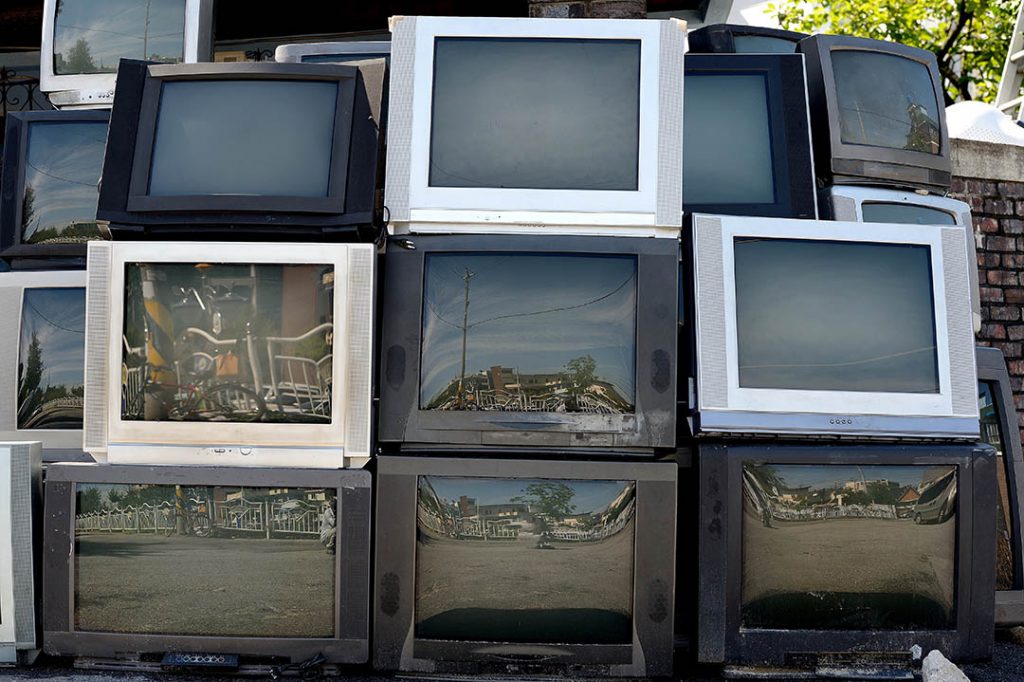
The CEO of Pennsylvania-based eLoop attributes the buildup of CRTs to a narrowing downstream and pandemic-related challenges. | Dongseun Yang/Shutterstock
Pandemic-era business conditions and the closure of a CRT outlet contributed to eLoop violating CRT accumulation rules last year, the CEO said. Now, the processor and regulators are working out a mandatory plan to clear out the stockpile.
“We’re fighting our way out of it; the end’s in sight,” Ned Eldridge, CEO of Export, Pa.-based eLoop, told E-Scrap News. “We’ve already reduced everything by over 50%.”
Under the U.S. EPA’s CRT rule, which allows CRT materials to avoid being regulated as hazardous waste as long as certain conditions are met, recycling facilities must turn over 75% of their inventory of CRT materials in the course of a year. If they don’t, the agency considers the stocks to be speculative accumulation.
Acting on a complaint about accumulated CRT materials, Pennsylvania Department of Environmental Protection (DEP) officials in October 2022 inspected the electronics recycling and reuse company’s State College, Pa. facility. They found over 3 million pounds of CRT materials, mostly CRT tubes with some whole TVs, were on-site as of the end of that September, according to an inspection report obtained by E-Scrap News.
Inspectors noted that eLoop had been sending out shipments of both tubes and intact TVs – including a shipment scheduled for the week following the inspection – but the total sent downstream since the beginning of 2022 was about 413,000 pounds, less than what is needed to avoid speculative accumulation and a violation of the company’s state general operating permit.
In response, the DEP issued a notice of violation but no financial penalty.
In an interview, Eldridge said the DEP has asked him to put together a schedule for how he’ll move all the material downstream to recycling markets between now and 2025. He’s expecting to receive a consent order reflecting that plan. He said he does not expect fines.
Downstream drying up
While CRTs are making up a smaller and smaller portion of the end-of-life stream of electronics, the loss of several downstream outlets over the years means that the lead-bearing glass is still dogging the industry.
Over the years, outlets in India, Mexico, Spain, the Netherlands, Canada and the U.S. have closed. That being said, there are still North American companies that will process CRT glass for use by smelters, ceramic tile manufacturers and other industries.
In eLoop’s case, the move by Novotec Recycling in Columbus, Ohio to stop accepting CRT glass impacted the company, Eldridge explained. Novotec used to process CRT glass into a feedstock for consumption by smelters, but after the company completed its contract to clean up tens of millions of pounds of CRT materials abandoned in Columbus by Closed Loop Refining and Recovery, Novotec appears to have exited the CRT business.
Novotec’s decision to halt acceptance of CRTs came after COVID-related closures resulted in a downturn in business and a reduction in eLoop’s cash, he said. As a result of those factors, “we slipped a little bit,” Eldridge said, noting that they shipped out 71% of CRT materials in 2020 and 67% in 2021. In 2022, he said, eLoop shipped about a million pounds downstream.
He said eLoop, which worked closely with DEP to gain permit approval for its flat-panel dismantling robot, does not have an adversarial relationship with state regulators. He noted that eLoop has regularly provided the DEP with its CRT mass balance data, even before the complaint and inspection.
The company remains a participant in Pennsylvania’s extended producer responsibility (EPR) program for electronics, albeit a smaller one. Reverse Logistics Group – which carries out e-scrap collection and recycling management obligations for several brand owners in Pennsylvania, including big names such as Acer, Apple, Lenovo, Microsoft and others – lists eLoop among its recycling vendors in its 2023 program plan.
“eLoop is one of multiple recyclers we are working with in Pennsylvania and they make up a small fraction of the total volume of covered devices managed by our group plan,” said Andriana Kontovrakis, director of compliance services for Reverse Logistics Group. “We are aware of the notice of violation and are in active communication with eLoop regarding the matter. We are currently awaiting the results of the negotiations on the consent order between eLoop and the PADEP.”
Evolving the business away from EPR
Eldridge said business in 2023 has bounced back and the company is doing better than during the past couple of years. “We’re back financially,” he said.
The company has resumed downstream shipments of CRTs this month, he said, noting that eLoop will send material to Dynamic Lifecycle Innovations, Kuusakoski and Des Moines, Iowa-based GKAT Reclamation.
All told, eLoop has cut in half the amount of CRTs it has accumulated since its peak year, 2016, when it had 5 million pounds to process, Eldridge said.
He also noted a shift in how the company handles CRTs – and even a larger evolution in recent years in the focus of eLoop.
In terms of CRT management, eLoop for the most part no longer does CRT TV disassembly, instead moving material to Dynamic or Kuusakoski to break down, he said. The company stopped around the time China stopped accepting e-plastics, which tightened up the plastics market, he said.
“We’re seeing a decrease in the amount of CRT material that’s coming through.”
–Ned Eldridge, CEO of eLoop
The e-Stewards-certified processor has also reduced its participation in the state EPR program in recent years, he said, as the OEMs began paying less and less for the recycling work. He said that Reverse Logistics Group, the only manufacturers program eLoop works with now, has been “fair and equitable,” but some of the OEMs in the past made promises to pay more as the CRT market changed but never followed through.
As a result, eLoop has pivoted more into the ITAD business and away from residential electronics recycling. Over the last three years, he estimated, 70% of eLoop’s business has come from ITAD work.
At the same time, “we’re seeing a decrease in the amount of CRT material that’s coming through and we’re seeing an increase in the amount of flatpanels,” he said. His State College facility is the first U.S. e-scrap plant to install the FPD Pro, a robot that removes hazardous substances from flat-panel display devices. That system is almost up and running.
With regard to the CRTs, Eldridge said eLoop will have to do its due diligence over the next two-and-a-half years to move material, but he insisted the company remains strong and “we’re not going to go out of business.”
“I have no doubt we’re going to be able to succeed,” he said.
More stories about CRTs
- CRT volumes decline, but end is not yet in sight
- Suppliers targeted for Iowa CRT stockpile cleanup costs
- California suggests upping e-scrap processing payments



